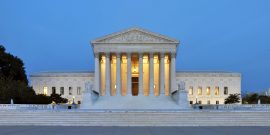May 11, 2016
Friday Roundup, May 18th
- Given the overwhelming need to reduce costs in legal education and the role tenure plays in this equation, Professor Bainbridge recently considered several rationales for tenure and how law schools might manage salary expectations for faculty if it is eliminated.
- Randy Barnett writes at Volokh on the difference between constitutional interpretation and construction: “[T]he so-called New Originalism is the recognition that there is a difference between two types of activities: the activity of interpretation and the activity of construction. Interpretation is the activity of ascertaining the semantic meaning of a text, including both its express and implied meanings, and taking into account the context of its utterance…. Construction is the activity of putting that meaning into action, or applying that meaning to particular cases and controversies when the information provided by the text is insufficient on its own and requires some sort of supplementation.”
- Point of Law looks at the recent spate of union and activist tactics to “kill business speech” through the proxy proposal process and concludes that they aren’t finding much success.
- Don Boudreaux at Cafe Hayek posts his letter to Senators Robert Casey of Pennsylvania and Chuck Schumer of New York regarding their proposal to “to punitively tax and to permanently bar from ever again entering America” men and women who renounce their citizenship in the U.S. to minimize tax liability.
- Richard Epstein at Ricochet casts even further doubt on Jeffrey Toobin’s severe criticism of Chief Justice John Roberts’ role in the Citizens United decision. Adam White also dissects Toobin at the Weekly Standard blog.
- In light of President Obama’s recent use of scripture to justify greater amounts of spending, Joe Carter at the Acton Powerblog asks President Obama the question: So who is our Keeper, Mr. President? He also links to this piece by Samuel Gregg that further explores the consolidationist approach of the current administration.
- At Public Discourse Gerard Bradley considers the HHS mandate through the lens of President Obama’s infamous commencement address at Notre Dame in 2009 and concludes that Obama was really articulating the position that “He would protect the state from the church, not by privatizing faith, but by redefining it. In a bold and unprecedented challenge to the churches, Obama told believers, not what they believe, but what it means for them to believe it.”
- In a heady post Peter Lawler explores the meaning of American Cartesianism.

